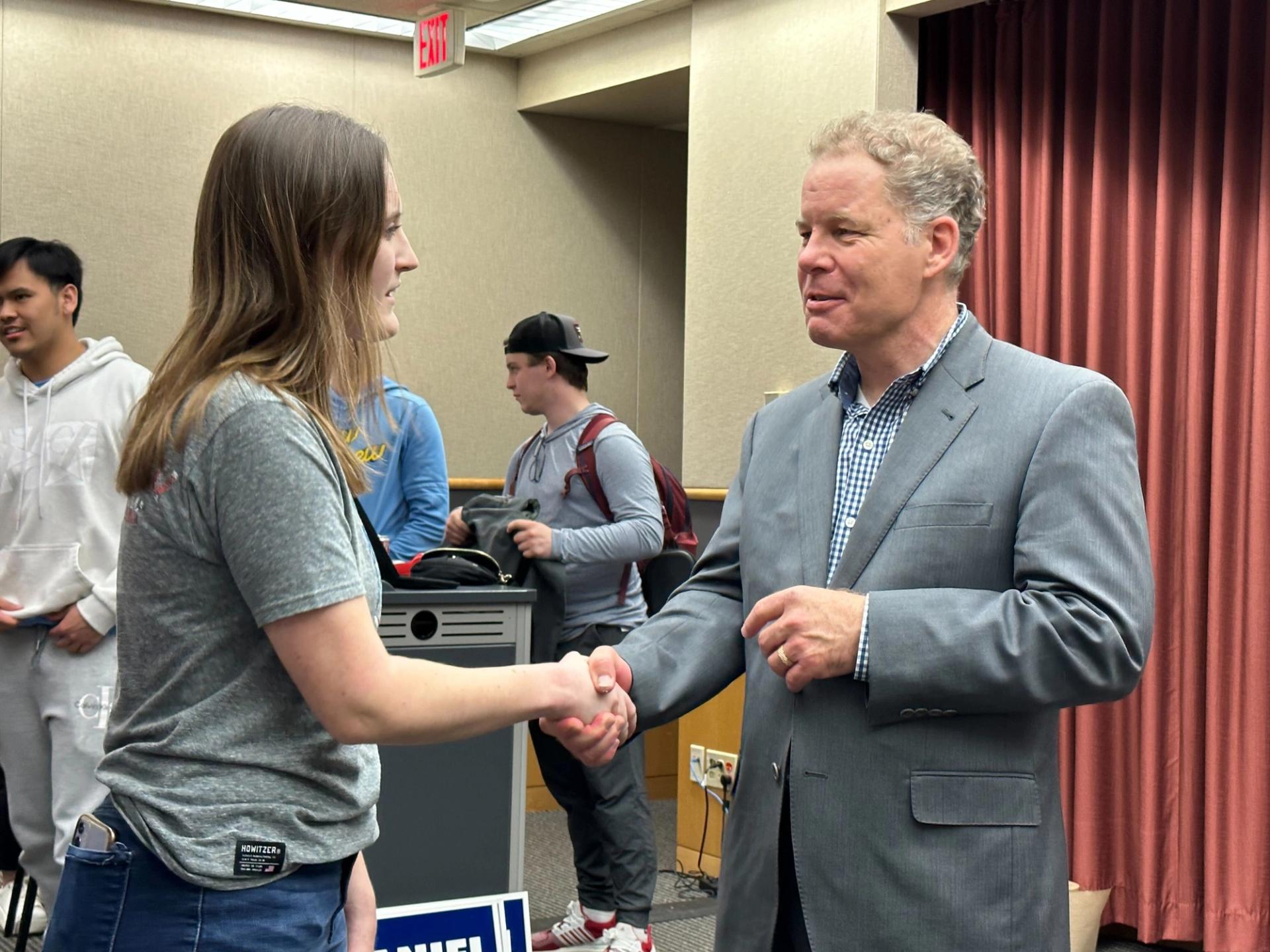The Scene
MADISON, Wis. – Daniel Kelly described the crimes in grisly detail. One man had violated his cousin “in the most personal, intimate way.” Another filmed the rape of a 13-year old girl for Facebook. Both, he said, got light sentences from Janet Protasiewicz, his rival for a swing seat on Wisconsin’s Supreme Court.
And it was her team, he said, that dragged the campaign into the gutter.
“How is it that we came to this point in time where you have to sacrifice your good name to run for office?” Kelly asked a group of college Republicans and conservative activists on Wednesday. “I would hate to see this kind of ugly game prevail.”
The most expensive court race in Wisconsin’s history — $40 million spent, more to come before April 4 — gives Democrats a once-in-a-decade chance of breaking a conservative majority. Their message, years in the making, is that voters can scrap the state’s 1849 abortion ban and replace a lopsided GOP legislative gerrymander by voting for Protasiewicz, a Milwaukee County judge. Her campaign has called the attacks on her sentencing “defamatory” and asked for them to be taken off air.
“I decided to run for this seat for really one simple reason, and that is to ensure that far right wing extremists do not hijack our Supreme Court,” Protasiewicz said at a candidate forum on the University of Wisconsin-Milwaukee campus on Tuesday. “Every single issue that you care about is going to be on the ballot.”
The Republican response has been twofold: Denouncing Protasiewicz for saying how she’d rule on specific issues, and scorching her reputation with ads that literally invoke the 1988 “Willie Horton” campaign against Mike Dukakis.
“They should not be able to take $10 million from California and New York, and lie to all of you,” said Shelley Grogan, a pro-Kelly judge on the court of appeals, at a Milwaukee County GOP meeting at a supper club this week. “Yet they are doing it in this race against Dan Kelly.”
David’s view
The bluntness of the Democrats’ message in Wisconsin inspired outrage on the right and worried chin-stroking from some liberals, uneasy with the concept of such openly partisan judicial elections. Republicans here warn that “the rule of law” might be replaced by “the rule of Janet,” and that if she wins, hyper-partisan court races will become the norm.
Protasiewicz and her allies say that they already were, especially in Wisconsin. After Dobbs, which put abortion rights back in the laps of state legislators and courts, the trend only accelerated.
“My value is that we have fair maps,” Protasiewicz said at the Tuesday night forum. “My value is that people should be able to make their own reproductive health care decisions.”
The Wisconsin Democratic Party has put $8.8 million behind Protasiewicz. According to chairman Ben Wikler, it has made as many voter contacts in this race as it did in the 2018 campaign for Gov. Tony Evers.
Democrats looking to graft partisan politics onto the judicial race believe they’re participating in an existing arms race with Republicans, who are more than happy to do the same when it benefits them. Four years ago, Democrats learned what didn’t work, losing a court race they were favored to win after Republicans sent out mailers linking the campaign to elect a liberal judge to the failed effort to keep Justice Brett M. Kavanaugh off the Supreme Court.
“The more progressive candidate ran a very traditional campaign focused on how qualified she was, and how she had support from across the political spectrum, and endorsements from other judges,” said Wikler. “That was the kind of campaign that used to succeed in this state, and that I think many people would love to see return. But the Republican candidate and his independent expenditure allies ran a scorched earth partisan operation that essentially ensured that every Republican in the state would vote for him.”
This time, they face the very real possibility of national politics again riling up Republican voters in a lower turnout runoff. News of Donald Trump’s indictment in faraway Manhattan is drawing universal condemnation on the right and the Wisconsin race could be a first test of how the conservative grassroots responds. Strategists on both sides were hesitant to make predictions to me about whether it would impact the race.

For now, at least, Democrats believe their strategy to stir up passions in their own base has been working. Republicans concede that Democrats drummed up more interest and money in the first round. Protasiewicz and Everett Mitchell, another liberal candidate, got a majority of all votes cast in the Feb. 28 primary. GOP lawmakers tried, and failed, to neutralize the abortion issue; legislators in Madison proposed a new law with more exceptions, which didn’t have the support to advance before Wisconsinites started voting.
“I’m amazed that abortion is still on every commercial when Republicans have said they want to allow for exceptions,” said Luanne Coyne, who chairs the Republican Women of Greater Milwaukee. “Voter ID and school choice — to me, that’s what’s important.”
But Democrats know that abortion rights is the issue with the broadest appeal, and that Kelly is vulnerable, citing his legal advice to Wisconsin Right to Life. Kelly has declined to say how he’d rule on abortion cases — “I am campaigning to be the most boring Supreme Court justice in the history of the state,” he said in Madison.
Kelly and his allies, are more comfortable attacking Protasiewicz as pro-criminal, with ad after ad from third-party groups describing the rapes committed by men who didn’t get the maximum sentence from the judge. Some have gone further, citing a conservative Wisconsin news site to accuse the Democrat-backed candidate of elder abuse and racism, charges she denied when asked by Semafor.
“She’s not only an awful judge, she’s also an awful person,” Grogan told Republicans at their Milwaukee meeting, calling the candidate “Janet Protasie-WITCH” and asking why the mainstream media wasn’t investigating the allegations.
All of this will be settled in an election that most Wisconsinites don’t usually vote in, adding a major element of unpredictability for election analysts, who give Democrats a highly tentative edge. Kelly, originally appointed to the court by former Gov. Scott Walker, lost a 2020 retention race held on the same day as the 2020 presidential primary. Half of the voters who’d show up for that year’s general election didn’t bother voting.
That’s why the high-minded rhetoric has been muddled by a campaign to turn out each party’s most passionate supporters — and why Dan Knodl, the Republican nominee in a competitive state senate race next week, has said he’d “consider” impeaching Protasiewicz if she wins.
“I thought that was a little surprising, given the fact that I have not yet been elected,” Protasiecz told Semafor. “It almost made me wonder if he thinks I’m going to be.”
The View From A Wisconsin Supreme Court Judge
“There were always ways to know what people’s values were by who was supporting them,” said Justice Rebecca Dallet, one of the court’s three liberals, who won her seat in 2018. “Now, if you’re more explicit about what your values are — that is the change. But I don’t see that big of a difference. And I think voters have a right to know who their candidates are.”
Notable
- In the New York Times, Michelle Goldberg argues that the judicial race could be the first step in reversing many of former Wisconsin Governor Scott Walker’s signature successes, which have left Democrats and labor in the state weakened.
